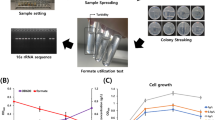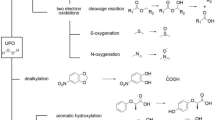Abstract
Poly gamma glutamic acid (γ-PGA) is an anionic polyamide with numerous applications. Previous studies revealed that L-proline metabolism is implicated in a wide range of cellular processes by increasing intercellular reactive oxygen species (ROS) generation. However, the relationship between L-proline metabolism and γ-PGA synthesis has not yet been analyzed. In this study, our results confirmed that deletion of Δ1-pyrroline-5-carboxylate dehydrogenase gene ycgN in Bacillus licheniformis WX-02 increased γ-PGA yield to 13.91 g L−1, 85.22% higher than that of the wild type (7.51 g L−1). However, deletion of proline dehydrogenase gene ycgM had no effect on γ-PGA synthesis. Furthermore, a 2.92-fold higher P5C content (19.24 μmol gDCW−1) was detected in the ycgN deficient strain WXΔycgN, while the P5C levels of WXΔycgM and the double mutant strain WXΔycgMN showed no difference, compared to WX-02. Moreover, the ROS level of WXΔycgN was increased by 1.18-fold, and addition of n-acetylcysteine (antioxidant) decreased its ROS level, which further reduced γ-PGA synthesis capability of WXΔycgN. Collectively, our results demonstrated that proline catabolism played an important role in maintaining ROS homeostasis, and deletion of ycgN-enhanced P5C accumulation, which induced a transient ROS signal to promote γ-PGA synthesis in B. licheniformis.







Similar content being viewed by others
References
Borsani O, Zhu J, Verslues PE, Sunkar R, Zhu J (2005) Endogenous siRNAs derived from a pair of natural cis-antisense transcripts regulate salt tolerance in Arabidopsis. Cell 123(7):1279–1291. https://doi.org/10.1016/j.cell.2005.11.035
Brody MS, Price CW (1998) Bacillus licheniformis sigB operon encoding the general stress transcription factor sigma B. Gene 212(1):111–118
Cai D, He P, Lu X, Zhu C, Zhu J, Zhan Y, Wang Q, Wen Z, Chen S (2017) A novel approach to improve poly-gamma-glutamic acid production by NADPH regeneration in Bacillus licheniformis WX-02. Sci Rep 7:43404. https://doi.org/10.1038/srep43404
Cai D, Hu S, Chen Y, Liu L, Yang S, Ma X, Chen S (2018) Enhanced production of poly-gamma-glutamic acid by overexpression of the global anaerobic regulator Fnr in Bacillus licheniformis WX-02. Appl Biochem Biotechnol 185:958–970. https://doi.org/10.1007/s12010-018-2693-7
Candela T, Fouet A (2006) Poly-gamma-glutamate in bacteria. Mol Microbiol 60(5):1091–1098. https://doi.org/10.1111/j.1365-2958.2006.05179.x
D'Autreaux B, Toledano MB (2007) ROS as signalling molecules: mechanisms that generate specificity in ROS homeostasis. Nat Rev Mol Cell Biol 8(10):813–824. https://doi.org/10.1038/nrm2256
Deuschle K, Funck D, Forlani G, Stransky H, Biehl A, Leister D, van der Graaff E, Kunze R, Frommer WB (2004) The role of [delta]1-pyrroline-5-carboxylate dehydrogenase in proline degradation. Plant Cell 16 (12):3413–3425 doi:https://doi.org/10.1105/tpc.104.023622
Feng J, Gao W, Gu Y, Zhang W, Cao M, Song C, Zhang P, Sun M, Yang C, Wang S (2014) Functions of poly-gamma-glutamic acid (gamma-PGA) degradation genes in gamma-PGA synthesis and cell morphology maintenance. Appl Microbiol Biotechnol 98(14):6397–6407. https://doi.org/10.1007/s00253-014-5729-0
Feng J, Gu Y, Quan Y, Cao M, Gao W, Zhang W, Wang S, Yang C, Song C (2015) Improved poly-gamma-glutamic acid production in Bacillus amyloliquefaciens by modular pathway engineering. Metab Eng 32:106–115. https://doi.org/10.1016/j.ymben.2015.09.011
Guo J, Cheng G, Gou X, Xing F, Li S, Han Y, Wang L, Song J, Shu C, Chen S, Chen L (2015) Comprehensive transcriptome and improved genome annotation of Bacillus licheniformis WX-02. FEBS Lett 589(18):2372–2381. https://doi.org/10.1016/j.febslet.2015.07.029
Hu CAA, Donald SP, Yu J, Lin W, Liu Z, Steel G, Obie C, Valle D, Phang JM (2007) Overexpression of proline oxidase induces proline-dependent and mitochondria-mediated apoptosis. Mol Cell Biochem 295(1–2):85–92. https://doi.org/10.1007/s11010-006-9276-6
Jiang F, Qi G, Ji Z, Zhang S, Liu J, Ma X, Chen S (2011) Expression of glr gene encoding glutamate racemase in Bacillus licheniformis WX-02 and its regulatory effects on synthesis of poly-gamma-glutamic acid. Biotechnol Lett 33(9):1837–1840. https://doi.org/10.1007/s10529-011-0631-7
Lee IR, Lui EYL, Chow EWL, Arras SDM, Morrow CA, Fraser JA (2013) Reactive oxygen species homeostasis and virulence of the fungal pathogen Cryptococcus neoformans requires an intact proline catabolism pathway. Genetics 194(2):421–433. https://doi.org/10.1534/genetics.113.150326
Liang X, Zhang L, Natarajan SK, Becker DF (2013) Proline mechanisms of stress survival. Antioxid Redox Signal 19(9):998–1011. https://doi.org/10.1089/ars.2012.5074
Man Z, Rao Z, Xu M, Guo J, Yang T, Zhang X, Xu Z (2016) Improvement of the intracellular environment for enhancing L-arginine production of Corynebacterium glutamicum by inactivation of H2O2-forming flavin reductases and optimization of ATP supply. Metab Eng 38:310–321. https://doi.org/10.1016/j.ymben.2016.07.009
Monteoliva MI, Rizzi YS, Cecchini NM, Hajirezaei MR, Alvarez ME (2014) Context of action of proline dehydrogenase (ProDH) in the hypersensitive response of Arabidopsis. BMC Plant Biol 14:21. https://doi.org/10.1186/1471-2229-14-21
Moses S, Sinner T, Zaprasis A, Stoveken N, Hoffmann T, Belitsky BR, Sonenshein AL, Bremer E (2012) Proline utilization by Bacillus subtilis: uptake and catabolism. J Bacteriol 194(4):745–758. https://doi.org/10.1128/JB.06380-11
Natarajan SK, Zhu W, Liang X, Zhang L, Demers AJ, Zimmerman MC, Simpson MA, Becker DF (2012) Proline dehydrogenase is essential for proline protection against hydrogen peroxide-induced cell death. Free Radical Bio Med 53(5):1181–1191. https://doi.org/10.1016/j.freeradbiomed.2012.07.002
Nishimura A, Nasuno R, Takagi H (2012) The proline metabolism intermediate delta1-pyrroline-5-carboxylate directly inhibits the mitochondrial respiration in budding yeast. FEBS Lett 586(16):2411–2416. https://doi.org/10.1016/j.febslet.2012.05.056
Nomura M, Takagi H (2004) Role of the yeast acetyltransferase Mpr1 in oxidative stress: regulation of oxygen reactive species caused by a toxic proline catabolism intermediate. Proc Natl Acad Sci U S A 101(34):12616–12621. https://doi.org/10.1073/pnas.0403349101
Ogunleye A, Bhat A, Irorere VU, Hill D, Williams C, Radecka I (2015) Poly-gamma-glutamic acid: production, properties and applications. Microbiology 161(Pt 1):1–17. https://doi.org/10.1099/mic.0.081448-0
Paul S, Aggarwal C, Thakur JK, Bandeppa GS, Khan MA, Pearson LM, Babnigg G, Giometti CS, Joachimiak A (2015) Induction of osmoadaptive mechanisms and modulation of cellular physiology help Bacillus licheniformis strain SSA 61 adapt to salt stress. Curr Microbiol 70(4):610–617. https://doi.org/10.1007/s00284-014-0761-y
Popov M, Petrov S, Nacheva G, Ivanov I, Reichl U (2011) Effects of a recombinant gene expression on ColE1-like plasmid segregation in Escherichia coli. BMC Biotechnol 11 18 https://doi.org/10.1186/1472-6750-11-18
Qi G, Kang Y, Li L, Xiao A, Zhang S, Wen Z, Xu D, Chen S (2014) Deletion of meso-2,3-butanediol dehydrogenase gene budC for enhanced D-2,3-butanediol production in Bacillus licheniformis. Biotechnol Biofuels 7(1):16. https://doi.org/10.1186/1754-6834-7-16
Qiu Y, Xiao F, Wei X, Wen Z, Chen S (2014) Improvement of lichenysin production in Bacillus licheniformis by replacement of native promoter of lichenysin biosynthesis operon and medium optimization. Appl Microbiol Biotechnol 98(21):8895–8903. https://doi.org/10.1007/s00253-014-5978-y
Rhee SG (2006) Cell signaling. H2O2, a necessary evil for cell signaling. Science 312(5782):1882–1883. https://doi.org/10.1126/science.1130481
Sahoo S, Rao KK, Suresh AK, Suraishkumar GK (2004) Intracellular reactive oxygen species mediate suppression of sporulation in Bacillus subtilis under shear stress. Biotechnol Bioeng 87(1):81–89. https://doi.org/10.1002/bit.20095
Si M, Zhang L, Yang Z, Xu Y, Liu Y, Jiang C, Wang Y, Shen X, Liu S (2014) NrdH Redoxin enhances resistance to multiple oxidative stresses by acting as a peroxidase cofactor in Corynebacterium glutamicum. Appl Environ Microbiol 80(5):1750–1762. https://doi.org/10.1128/AEM.03654-13
Signorelli S, Coitino EL, Borsani O, Monza J (2014) Molecular mechanisms for the reaction between (•)OH radicals and proline: insights on the role as reactive oxygen species scavenger in plant stress. J Phys Chem B 118(1):37–47. https://doi.org/10.1021/jp407773u
Silva F, Queiroz JA, Domingues FC (2012) Evaluating metabolic stress and plasmid stability in plasmid DNA production by Escherichia coli. Biotechnol Adv 30(3):691–708. https://doi.org/10.1016/j.biotechadv.2011.12.005
Singh S, Brocker C, Koppaka V, Chen Y, Jackson BC, Matsumoto A, Thompson DC, Vasiliou V (2013) Aldehyde dehydrogenases in cellular responses to oxidative/electrophilic stress. Free Radic Biol Med 56:89–101. https://doi.org/10.1016/j.freeradbiomed.2012.11.010
Szabados L, Savoure A (2010) Proline: a multifunctional amino acid. Trends Plant Sci 15(2):89–97. https://doi.org/10.1016/j.tplants.2009.11.009
Tang B, Zhang D, Li S, Xu Z, Feng X, Xu H (2016) Enhanced poly(gamma-glutamic acid) production by H2O2-induced reactive oxygen species in the fermentation of Bacillus subtilis NX-2. Biotechnol Appl Biochem 63(5):625–632. https://doi.org/10.1002/bab.1416
Tian G, Fu J, Wei X, Ji Z, Ma X, Qi G, Chen S (2014) Enhanced expression of pgdS gene for high production of poly-γ-glutamic acid with lower molecular weight in Bacillus licheniformis WX-02. J Chem Technol Biotechnol 89(12):1825–1832. https://doi.org/10.1002/jctb.4261
Tian G, Wang Q, Wei X, Ma X, Chen S (2017) Glutamate dehydrogenase (RocG) in Bacillus licheniformis WX-02: enzymatic properties and specific functions in glutamic acid synthesis for poly-gamma-glutamic acid production. Enzym Microb Technol 99:9–15. https://doi.org/10.1016/j.enzmictec.2017.01.002
Wei Z, Bai L, Deng Z, Zhong J (2011) Enhanced production of validamycin a by H2O2-induced reactive oxygen species in fermentation of Streptomyces hygroscopicus 5008. Bioresour Technol 102(2):1783–1787. https://doi.org/10.1016/j.biortech.2010.08.114
Wei X, Tian G, Ji Z, Chen S (2015) A new strategy for enhancement of poly-γ-glutamic acid production by multiple physicochemical stresses in Bacillus licheniformis. J Chem Technol Biotechnol 90(4):709–713. https://doi.org/10.1002/jctb.4362
Yangtse W, Zhou Y, Lei Y, Qiu Y, Wei X, Ji Z, Qi G, Yong Y, Chen L, Chen S (2012) Genome sequence of Bacillus licheniformis WX-02. J Bacteriol 194(13):3561–3562. https://doi.org/10.1128/JB.00572-12
Zaprasis A, Brill J, Thuring M, Wunsche G, Heun M, Barzantny H, Hoffmann T, Bremer E (2013) Osmoprotection of Bacillus subtilis through import and proteolysis of proline-containing peptides. Appl Environ Microbiol 79(2):576–587. https://doi.org/10.1128/AEM.01934-12
Zarse K, Schmeisser S, Groth M, Priebe S, Beuster G, Kuhlow D, Guthke R, Platzer M, Kahn CR, Ristow M (2012) Impaired insulin-/IGF1-signalling extends life span by promoting mitochondrial L-proline catabolism to induce a transient ROS-signal. Cell Metab 15(4):451–465. https://doi.org/10.1016/j.cmet.2012.02.013
Zhan Y, Zhu C, Sheng B, Cai D, Wang Q, Wen Z, Chen S (2017) Improvement of glycerol catabolism in Bacillus licheniformis for production of poly-gamma-glutamic acid. Appl Microbiol Biotechnol 101(19):7155–7164. https://doi.org/10.1007/s00253-017-8459-2
Zhang L, Alfano JR, Becker DF (2015) Proline metabolism increases katG expression and oxidative stress resistance in Escherichia coli. J Bacteriol 197(3):431–440. https://doi.org/10.1128/JB.02282-14
Zheng L, Wang C, Luo T, Lu B, Ma H, Zhou Z, Zhu D, Chi G, Ge P, Luo Y (2017) JNK activation contributes to oxidative stress-induced parthanatos in glioma cells via increase of intracellular ROS production. Mol Neurobiol 54(5):3492–3505. https://doi.org/10.1007/s12035-016-9926-y
Funding
This work was supported by the National Program on Key Basic Research Project (973 Program, No. 2015CB150505), the Technical Innovation Special Fund of Hubei Province (2018ACA149), and the Science and Technology Program of Wuhan (20160201010086).
Author information
Authors and Affiliations
Contributions
B Li, Z He, and S Chen designed the study. B Li carried out the molecular biology studies and construction of engineering strains. B Li and S Hu carried out the fermentation studies. B Li, D Cai, A Zhu, and S Chen analyzed the data and wrote the manuscript. All authors read and approved the final manuscript.
Corresponding author
Ethics declarations
Ethical approval
This article does not contain any studies with human participants or animals performed by any of the authors.
Conflict of interests
The authors declare that they have no conflict of interest.
Electronic supplementary material
ESM 1
(PDF 432 kb)
Rights and permissions
About this article
Cite this article
Li, B., Cai, D., Hu, S. et al. Enhanced synthesis of poly gamma glutamic acid by increasing the intracellular reactive oxygen species in the Bacillus licheniformis Δ1-pyrroline-5-carboxylate dehydrogenase gene ycgN-deficient strain. Appl Microbiol Biotechnol 102, 10127–10137 (2018). https://doi.org/10.1007/s00253-018-9372-z
Received:
Accepted:
Published:
Issue Date:
DOI: https://doi.org/10.1007/s00253-018-9372-z




